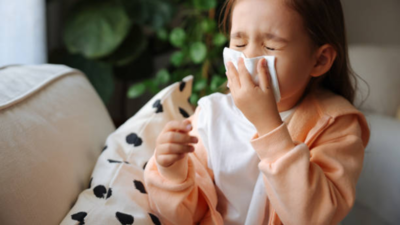ARTICLE AD BOX

Every monsoon and winter, hospitals see a rise in babies struggling with severe cough, breathing trouble, or symptoms that seem like an upper respiratory tract infection or pneumonia.
Many parents assume it's just a common cold, but often, it turns out to be something more serious like Respiratory Syncytial Virus (RSV). This highly contagious virus is one of the most common causes of lower respiratory infections in children under five, and in some cases it may become dangerous, especially for infants in their first year.
RSV: More than just a cold
RSV usually starts with signs that look like a regular cold—runny nose, mild cough, and slight fever.
But in some infants, especially those within one year of age, RSV can worsen rapidly. Within a short span, symptoms can worsen, leading to difficulty in breathing and a need for hospital care.
Why babies under one are more vulnerable
In the first year, a baby’s immune system and lungs are still in the development stage. Their airways are narrower, and any swelling or mucus caused by an infection can block airflow more easily than in older children or adults. This puts them at higher risk of complications like wheezing and pneumonia.
It's not just preterm or high-risk babies, in fact, most RSV-related hospital admissions involve full-term, previously healthy infants. Even after recovery, severe RSV infections can lead to long-term issues like recurrent wheezing, increased chances of asthma, and frequent ear infections that can affect hearing and speech development later in life.
How a single shot can help protect
In India, RSV infections tend to peak during monsoon and early winter seasons.
However, RSV may circulate year-round. This makes it important for parents and healthcare providers to stay alert beyond just the traditional ‘season’. Thanks to advances in healthcare, we now have options to protect babies from RSV. While the RSVpreF vaccine (maternal vaccine) is currently unavailable in India, monoclonal antibodies Palivizumab and Nirsevimab offer effective options for RSV prevention. While Palivizumab is limited to use in high-risk infants, Nirsevimab, a single-shot immunization that will soon be available, is suitable for administration to all infants shortly after birth or before they leave the hospital.
If they miss it, it can still be given later during a regular check-up.RSV spreads quickly and hits hard before you even realize it. That’s why protecting your baby early, before symptoms appear, is the best way to avoid serious illness. Parents should talk to their doctors about RSV prevention soon after their child is born. The first year is a time to grow, play, and explore, not to spend in hospital beds fighting preventable infections. With the right awareness and timely protection, we can ensure infants get the healthy start they deserve.
As we say prevention is better than cure, especially with viral illnesses such as RSV as there is no definite treatment once you get affected.Author: Dr. Raghuram Mallaiah, Senior Director Neonatology, Fortis La Femme GK-II, New Delhi



.png)
.png)
.png)
















 3 hours ago
4
3 hours ago
4









 English (US) ·
English (US) ·